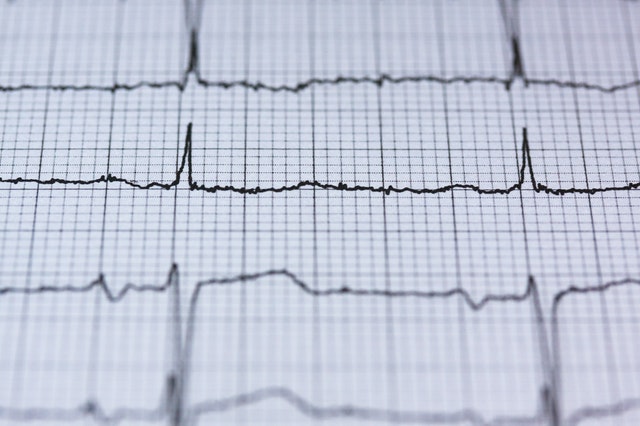Magnesium (Mg) is a major mineral. It needs in higher amounts unlike the trace minerals, like zinc or iron. The amount of magnesium required daily depends on a person’s age and gender. It is an important part of the more than 300 enzymes found in your body. These enzymes helps to regulate many bodily functions, including the production of energy, body protein, and muscle contractions in the process. Magnesium plays many crucial roles in the body, such as supporting muscle and nerve function and energy production and also plays a role in maintaining healthy bones and a healthy heart.
Recommended Dietary Allowances of Magnesium
The recommended daily intake by the Indian Council for Medical Research is 340 mg of magnesium for men and 310 mg for women. Females who are 19 years and older (and not pregnant) need 310 to 320 milligrams (mg) daily; whereas males of the same age should strive for 400 to 420 mg per day. The intake of magnesium in the human body happens only through food. The adult human body contains about 20-25 grams of magnesium and 60-70% of it is present in the bones; the rest resides in soft tissue like muscle. The human skeleton acts as a magnesium reservoir, buffering magnesium concentration in the blood. As we age, the mg reservoir in bones is reduced to nearly one-half throughout a lifetime.
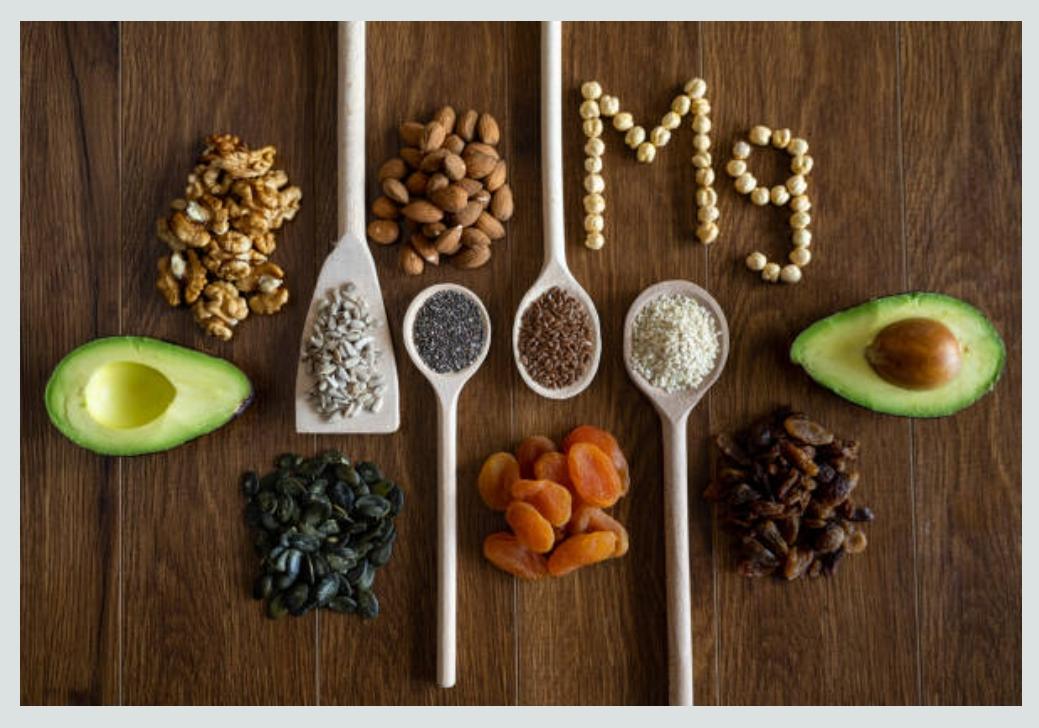
A magnesium deficiency can lead to muscle spasms, increased risk of heart disease, diabetes, high blood pressure, anxiety disorders, migraines, osteoporosis, and cerebral infarction. Conversely, consuming too much magnesium can cause diarrhea as the body attempts to excrete the excess.
Low mg levels usually don’t cause symptoms. However, chronically low levels can increase the risk of high blood pressure, heart disease, type 2 diabetes, and osteoporosis. Too much magnesium from foods isn’t a concern for healthy adults. However, the same can’t be said for supplements. High doses of mg from supplements or medications can cause nausea, abdominal cramping, and diarrhea.
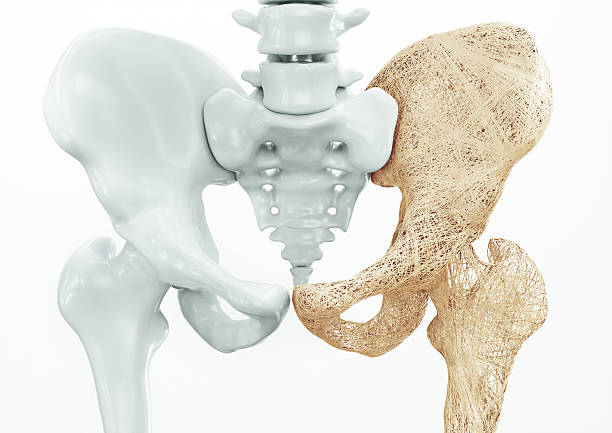
In addition, the magnesium in supplements can interact with some types of antibiotics and other medicines. Check with your doctor or pharmacist if you’re considering magnesium supplements, especially if you routinely use magnesium-containing antacids or laxatives.
Study regarding Magnesium
Magnesium-rich foods support a healthy immune system and improve bone health, but they may also play a role in preventing certain cancers. in 2017, according to a study published in the established in the European Review for Medical and Pharmacological Sciences. Mg in food helps to improve heart health, prevents stroke, and even potentially reduces your risk of dying from a heart attack. Additionally, magnesium foods help to support normal nerve and muscle function and keep your heartbeat in sync.
In 2017, a study published in Molecular Nutrition and Food Research found that a nutritionally balanced vegan diet filled with fresh fruit and vegetables lowered triglycerides, insulin, and cholesterol in study participants when compared with a healthy, controlled omnivorous diet (both plant and animal foods).
Symptoms and Causes
Muscle cramps, fatigue, arrhythmia, dizziness, nausea, numbness, insomnia, brain fog, and anxiety are just a few of the symptoms that magnesium. Eating the wrong foods, excessive alcohol consumption, some prescription medications, high-sugar diets, over-use of acid inhibitors, and leaky gut syndrome are caused by Magnesium Deficiency. Insufficient mg in the body and thus it is important to include magnesium rich food sin your diet.
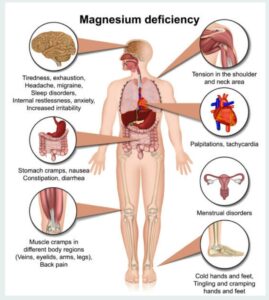
Sources of Magnesium
Food
It’s best to get nutrients, like magnesium, from food sources whenever possible, since they provide other health benefits, too. Many of the foods that are good sources of magnesium. Foods rich in magnesium include green leafy vegetables, whole grains, beans, and nuts. Milk and yogurt also provide magnesium, as do fortified foods, such as some breakfast cereals.
A plant-based diet includes magnesium-rich fruit, vegetables, beans and peas, grains, soy, seeds, and nuts. A vegetarian eats plant-based but on the other hand, a vegan diet excludes all meat, dairy, and animal products.
Nuts, seeds, whole grains, beans, leafy vegetables, milk, yogurt, and fortified foods are good sources. One ounce of almonds contains 20% of the daily mg an adult needs. Even water (tap, mineral, or bottled) can provide magnesium. Some laxatives and antacids also contain magnesium.
In general, foods containing dietary fiber provide mg. Some of the breakfast cereals and other fortified foods also contains magnesium. Some types of food processing, such as refining grains in ways that remove the nutrient-rich germ and bran, lower magnesium content substantially. Tap, mineral, and bottled waters can also be sources of magnesium, but the amount of mg in water varies by source and brand (ranging from 1 mg/L to more than 120 mg/L). Approximately human body absorbs 30% to 40% of the dietary magnesium that we consume.
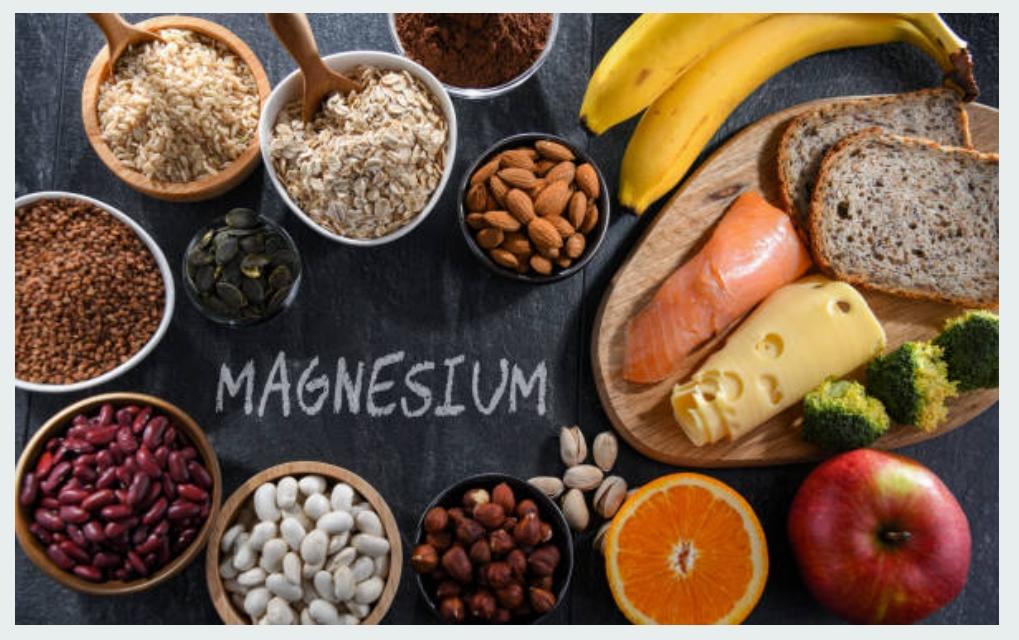
Dietary supplements
Magnesium supplements are available in a variety of forms, including magnesium oxide, citrate, and chloride. The Supplement Facts panel on a dietary supplement label declares the amount of elemental magnesium in the product, not the weight of the entire magnesium-containing compound.
Absorption of magnesium from different kinds of magnesium supplements varies. Human gut absorbs a soluble form of Magnesium. Magnesium that gets dissolve in liquid easily. Some of these forms includes aspartate, citrate, lactate and chloride forms is absorbed more completely and is more bioavailable than magnesium oxide and magnesium sulfate. One of the study shows, a very high doses of zinc from supplements (142 mg/day) can interfere with magnesium absorption and disrupt the magnesium balance in the body.
Medicines
Magnesium is a primary ingredient in some laxatives. Magnesium involves in some remedies for heartburn and upset stomachs due to acid indigestion. Extra-strength Rolaids, for example, provides 55 mg of elemental magnesium (as magnesium hydroxide) per tablet.
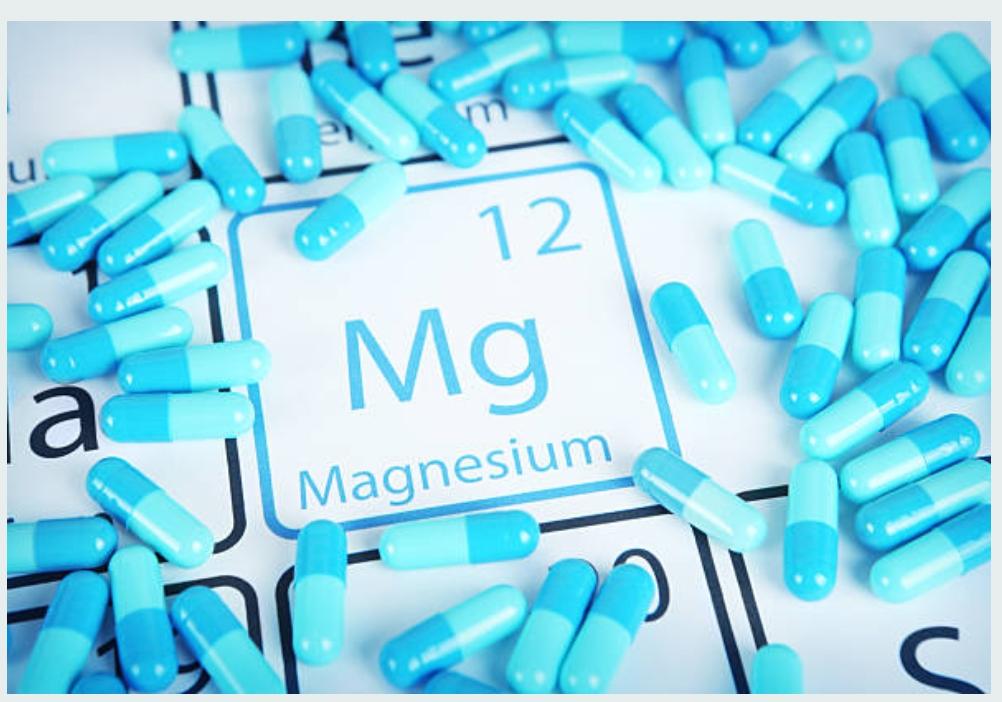
Magnesium Deficiency
Symptomatic magnesium deficiency due to low dietary intake in otherwise-healthy people is uncommon because the kidneys limit the urinary excretion of this mineral. However, habitually low intakes or excessive losses of magnesium due to certain health conditions, chronic alcoholism, and/or the use of certain medications can lead to magnesium deficiency.
Early signs of magnesium deficiency include loss of appetite, nausea, vomiting, fatigue, and weakness. As magnesium deficiency worsens, numbness, tingling, muscle contractions and cramps, seizures, personality changes, abnormal heart rhythms, and coronary spasms can occur. Severe magnesium deficiency can result in hypocalcemia or hypokalemia (low serum calcium or potassium levels, respectively) because mineral homeostasis is disrupted.
Groups at Risk of Magnesium Inadequacy
Magnesium inadequacy can occur when intakes fall below the RDA. When the intake is above the amount required, it helps to prevent over deficiency. The following groups are more likely than others to be at risk of magnesium inadequacy because they typically consume insufficient amounts or they have medical conditions (or take medications) that reduce magnesium absorption from the gut or increase losses from the body.
People with gastrointestinal diseases
Chronic diarrhea and fat malabsorption resulting from Crohn’s disease, gluten-sensitive enteropathy (celiac disease), and regional enteritis can lead to magnesium depletion over time. Resection or bypass of the small intestine, especially the ileum, typically leads to malabsorption and magnesium loss.
People with type 2 diabetes
Magnesium deficits and increased urinary magnesium excretion can occur in people with insulin resistance and/or type 2 diabetes. The magnesium loss appears to be secondary to higher concentrations of glucose in the kidney that increase urine output.
People with alcohol dependence
Magnesium deficiency is common in people with chronic alcoholism. In these individuals, poor dietary intake and nutritional status; gastrointestinal problems, including vomiting, diarrhea, and steatorrhea (fatty stools) resulting from pancreatitis; renal dysfunction with excess excretion of magnesium into the urine; phosphate depletion; vitamin D deficiency; acute alcoholic ketoacidosis; and hyperaldosteronism secondary to liver disease can all contribute to decreased magnesium status.
Older adults
Older adults have lower dietary intakes of magnesium than younger adults. Magnesium absorption from the gut decreases, and renal magnesium excretion increases with age. Older adults are also more likely to have chronic diseases or take medications that alter magnesium status, which can increase their risk of magnesium depletion.
Magnesium and Diseases
Habitually low intakes of magnesium induce changes in biochemical pathways that can increase the risk of illness over time. Magnesium may involve in: hypertension and cardiovascular disease, type 2 diabetes, osteoporosis, and migraine headaches.
Hypertension and cardiovascular disease
Hypertension is a major risk factor for heart disease and stroke. A diet containing more magnesium because of added fruits and vegetables, more low-fat or non-fat dairy products, and less fat overall was shown to lower systolic and diastolic blood pressure by an average of 5.5 and 3.0 mmHg, respectively. However, this Dietary Approaches to Stop Hypertension (DASH) diet also increases intakes of other nutrients, such as potassium and calcium, that are associated with reductions in blood pressure, so any independent contribution of magnesium cannot be determined. Higher magnesium intake might reduce the risk of stroke. 100 mg/day of magnesium in the diet is associated with an 8% decreased risk of total stroke, especially ischemic rather than hemorrhagic stroke.
Type 2 diabetes
Diets with higher amounts of magnesium are associated with a significantly lower risk of diabetes, possibly because of the important role of magnesium in glucose metabolism. Hypomagnesemia might worsen insulin resistance, a condition that often precedes diabetes, or it might be a consequence of insulin resistance. Diabetes leads to increased urinary losses of magnesium, and the subsequent magnesium inadequacy might impair insulin secretion and action.
The American Diabetes Association states that there is insufficient evidence to support the routine use of magnesium to improve glycemic control in people with diabetes.
Frequently Asked Questions
Can too much or too little magnesium be harmful?
The magnesium that is naturally present in food is not harmful and does not need to be limited. Magnesium in dietary supplements and medications should not be consumed in amounts above the upper limit unless recommended by a healthcare provider. Cramps and diarrhea are common side effects.
How Can I Raise My Magnesium Quickly Through Diet?
Magnesium supplements are available over the counter at most supermarkets and pharmacies. But, registered dietitians say it is preferable to eat whole foods containing magnesium naturally to prevent a mg deficiency. While your body absorbs between 30 and 40 percent of the magnesium you eat. Mg deficiency may happen due to an underlying health condition, alcoholism, or certain medication, per the National Institutes of Health.







